News

News 1
ETRI Secures Leadership in International Standardization of the Metaverse
- Leading the development of 52 metaverse-related international standards deliverables... Expanding its global influence
- Acting as a key player in the development of 6 key deliverables related to the platform interoperability and the integration of virtual and real worlds... Laying a foundation for providing interoperability over metaverse cross platforms
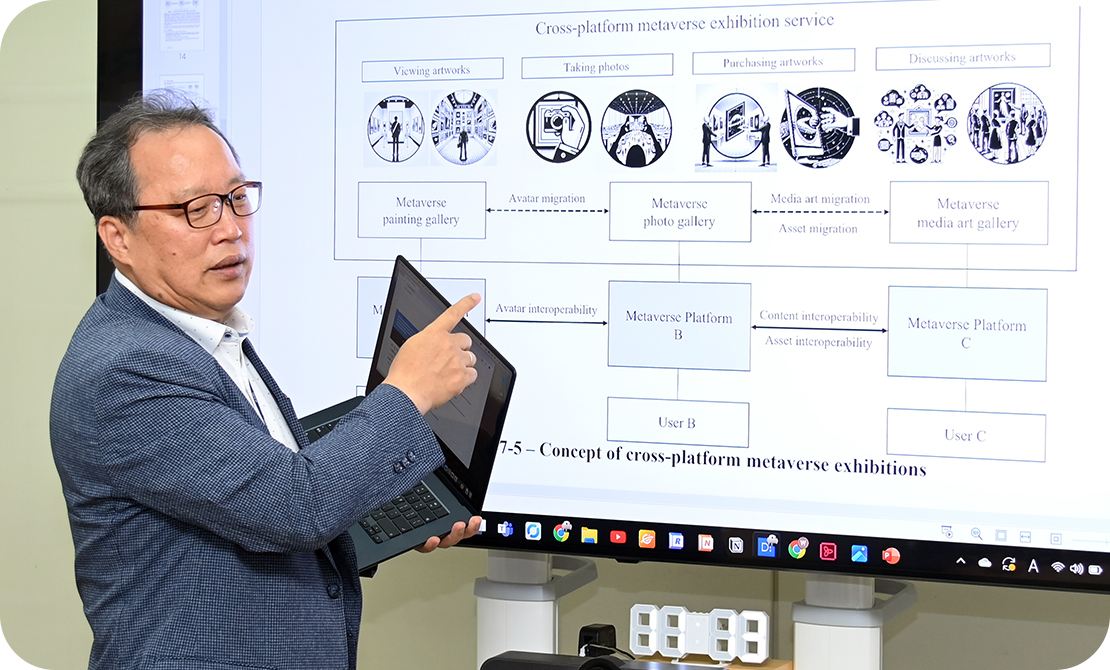
The activities of Focus Group* on metaverse (FG-MV), a special group under the International Telecommunication Union (ITU) of the United Nations (UN), which have been led by a Korean expert, have successfully concluded its lifetime with a total of 52 international standards deliverables approved.
Electronics and Telecommunications Research Institute (ETRI) announced that ITU FG-MV activities, led by Dr. Shin-Gak KANG, the chairman of FG-MV, have been successfully finalized at the 7th FG-MV** meeting, which was held on 12-13 June 2024 in Geneva, Switzerland. It is expected that the deliverables*** developed by FG-MV will provide the foundation for and be utilized by many SDOs (standards development organizations) as well as ITU for subsequent metaverse standardization work.
During the past 18 months of FG-MV activities, a total of 52 deliverables related to the metaverse were approved, covering not only technical issues related to the metaverse, but also various aspects such as security and privacy, accessibility, regulation, competition, and sustainability. This is evaluated as an unprecedented outcome among Focus Group activities operated by ITU, and is being recalled as even more surprising achievements considering the very short period of life time.
* Focus Group: An instrument to provide an additional working environment for the quick development of standards in specific areas, acting as an incubator for future emerging issues. It is open to non-ITU members.
** FG-MV (ITU Focus Group on Metaverse): A focus group dedicated to the standardization of metaverse issues, which was established under the TSAG.
*** Deliverable: A type of standard documents that are developed as a result of the standardization activities of Focus Group. Deliverables are then provided to the ITU-T Study Groups (SGs) for the subsequent standardization and it can be adopted as a ITU-T standard document such as Recommendation, Technical Report.
| Type | Content |
|---|---|
| 1 | Overview of Metaverse - Basic concept, ecosystem model, and overview of the metaverse for major service providers/participants - Metaverse characteristics, use cases in key areas, user experience, consistent service environment, analysis of economic/environmental/social/cultural value creation |
| 2 | Service Scenarios and High-Level Requirements for Metaverse Cross-Platform Interoperability - Providing service scenarios and higher-level requirements to ensure cross-platform interoperability for metaverse - Presenting the need to create a proper environment to ensure interoperability between different metaverse platforms & Providing service scenarios and requirements for 4 types of cross-platform interoperability |
| 3 | High-Level Interoperability Architecture for Cross-Platform Metaverse - Providing a high-level interoperability architecture for cross-platform metaverse - Providing a functional architecture, core components, interaction overview, reference points, and operational procedures for the effective integration and collaboration across various metaverse platforms |
| 4 | Requirements for the Metaverse based on Digital Twins Enabling Integration of Virtual and Physical Worlds - Providing service scenarios and requirements for digital twin-based integration of the virtual and physical world - Introducing various use cases, service scenarios, definition of digital twin, metaverse, and requirements related to system interactions |
| 5 | Reference Model for the Metaverse based on a Digital Twin Enabling Integration of Virtual and Physical Worlds - Providing a digital twin-based metaverse reference model for the integration of the virtual and physical world - Establishment of an interactive reference model and digital twin-based metaverse reference model |
| 6 | Metaverse Standardization Landscape for Gap Analyses - Analysis of existing standards and standards that are currently in development by major standard development organizations (SDOs) - Providing metaverse standardized gap analysis data to facilitate the development of interoperable metaverse-related standards |
List of 6 Key FG-MV Deliverables developed through the leading work of ETRI experts
ETRI has led the development of six standard deliverables including ▲Metaverse Overview ▲Platform Interoperability ▲Digital Twin-based integration of Virtual and Real World, etc. In addition, ETRI also announced that they have successfully developed 4 more standard documents (▲Definition of Metaverse & Glossary ▲Interoperability of Object Identification between Platforms ▲Reliable Metaverse, etc.) through joint development work with domestic and foreign institutions.
As a result of active participation and leading role in FG-MV activities, Korea’s metaverse-related technology is expected to have a significant impact on the future metaverse market. In particular, Korea’s proposal established the concept of standard technology and related standard deliverables were developed for providing interoperability between metaverse platforms and services for the first time in the world. This is expected to contribute greatly to the growth of the metaverse industry and services worldwide in the future.
In addition, based on the proposal made by FG-MV, ITU held the first UN Virtual Worlds Day in Geneva, Switzerland on June 14. 18 UN agencies and more than 350 participants from around the world has participated in the event, successfully reaching a consensus to promote the realization of a sustainable future based on the metaverse.
The establishment of FG-MV was proactively proposed by Republic of Korea and unanimously approved by the Member States and Sector members attending the ITU-T Telecommunications Standardization Advisory Group (TSAG)* meeting in December 2022. Dr. Shin-Gak KANG of the ETRI, Korea was nominated as the sole candidate and elected as the chairman of FG-MV.
Taking into account the regional balance of ITU member countries around the world and the characteristics of affiliated organizations, 11 experts from around the world from various fields (government, industry, academia, international organizations, etc.) were appointed as vice-chairmen. A total of 9 working groups (WG) and 20 task groups (TG) on major topics were also formed and worked for each specific technical field. As such, more than 500 global experts have participated in FG-MV to conduct various standards development works and related activities on the metaverse.
FG-MV held a total of seven regular meetings in countries belonging to different regions such as Saudi Arabia, China, Mexico, and Switzerland. A total of 1,156 contributions submitted by experts from various fields in the world were reviewed and discussed through 155 times of WG and TG electronic meetings, and standard development work for 63 work items has been carried out over a period of 18 months.
In connection with the standardization activities of FG-MV, ITU metaverse forums have been held five times to promote standardization activities and encourage active participation of users and stakeholders from various fields related to metaverse. The metaverse has received a lot of attention, with records being set, such as more than 17,000 concurrent viewers connecting to the forum event’s live streaming platform.
Bang Seung-chan, the president of ETRI, stated that “The metaverse is widely regarded as a future platform and service technology that will greatly advance the Internet we are currently using. It will bring about great changes in our society as a whole and lead innovations in various industrial fields in the future.”
ETRI claimed that its experience in leading the global standardization activities of ITU FG-MV has contributed to enhancing the institution’s technological influence and position in international standardization organizations, and is also in line with one of the main goals of ETRI’s institutional operation plan, ‘Making the jump to a world-class research institution and leading the world.’
Lee Byeong Jin, the Director of the Digital Content Division of the Ministry of Science and ICT, said, “The metaverse is definitely one of the main digital innovation technologies that the government of the Republic of Korea is extremely interested in and is providing active support. In this regard, the activities of FG-MV is meaningful in that they have not only covered the technical aspects of the metaverse, but also covered other significant areas such as safety, accessibility, inclusion, sustainability, and regulatory and competitive issues.”
FG-MV’s achievements will be used as the basis for the future standards development activities of ITU-T study groups (SGs) in the next study period (2025-2028). Additionally, it is expected to have an impact on the relevant standardization activities on metaverse of many SDOs.
* ITU-T TSAG (Telecommunication Standardization Advisory Group): An advisory group established in 1993 by ITU to cope with the rapidly changing IT standardization environment.
Shin-Gak KANG, Principal Researcher
Intelligence & Information Standards Research Section
(+82-42-860-6117 sgkang@etri.re.kr)
News 2
ETRI, Helping Public Decision-Making with AI-Based Policy Intelligence System
- Cooperation with Austria’s IIASA to develop an advanced AI-based policy intelligence system to assist the decision-making of public policies
- Strengthened research/academical cooperation to solve global challenges such as population, climate, and environmental issues
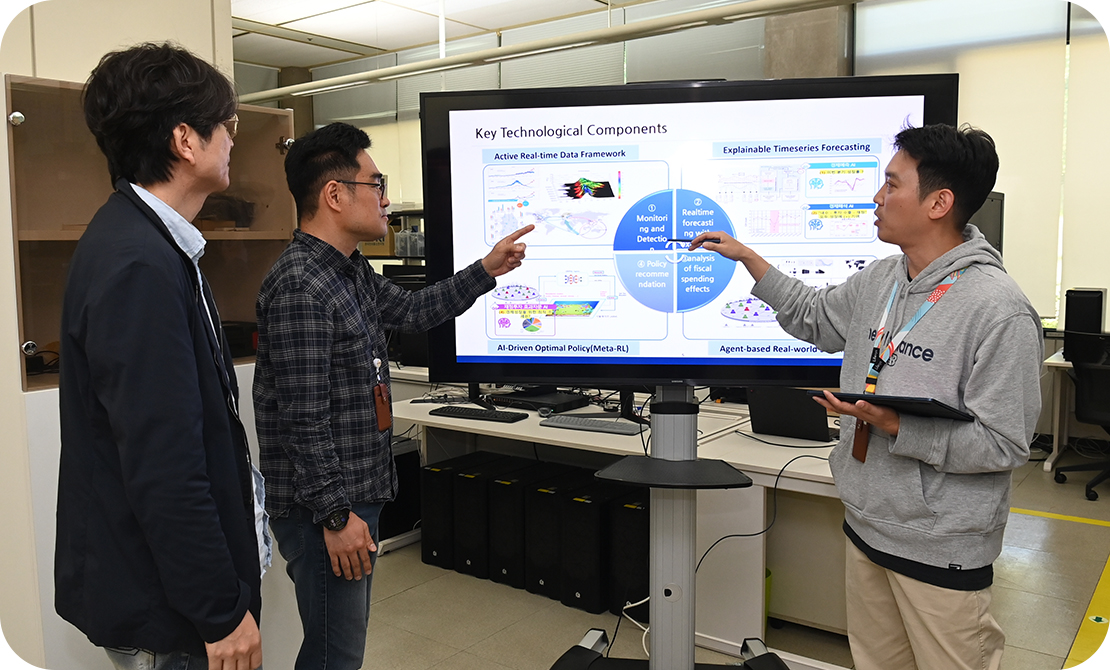
Korean researchers are pushing for a new AI-based policy intelligence research project that can assist the public decision-making and policy execution of domestic and foreign local governments.
Electronics and Communications Research Institute (ETRI) announced on July 1 that they have decided to establish a cooperative system with the International Institute for Applied Systems Analysis (IIASA)* to conduct further research regarding the development of an AI policy intelligence system that can assist public policy decision-making.
Together with IIASA, the research team of ETRI is planning to develop a policy intelligence system that can provide practical help in the government’s execution of public policies. In addition, they also plan to expand the field of public policy intelligence and put their focus on the research of new sustainable future technologies.
Through this agreement, the two institutions will strengthen their international cooperation to address global challenges such as population issues, climate changes, environmental change, etc., starting with the advancement of the MABM (Macro Agent-Based Model)**.
* International Institute for Applied Systems Analysis (IIASA): An independent international research institute located in Laxenburg, Austria. Founded in 1972, IIASA mainly focuses on interdisciplinary scientific research to provide valuable policy insights and solutions to complex global-scale issues that requires worldwide support and cooperation such as climate change, sustainable development, energy security, human welfare, etc. The IIASA aims to bring together researchers from all around the world to ensure a high level of cooperation and collaboration, providing a scientific foundation for global policymakers to respond to urgent global issues and challenges.
** MABM (Macro Agent-Based Model): A model that puts an emphasis on the behaviors of individual agents and the interactions between them to analyze and simulate macro-economic phenomena or social systems. This model is a part of a methodology to study the micro-level behavior of individual components (agents) to properly understand and predict the overall behavior and mechanism of the complex system as a whole.
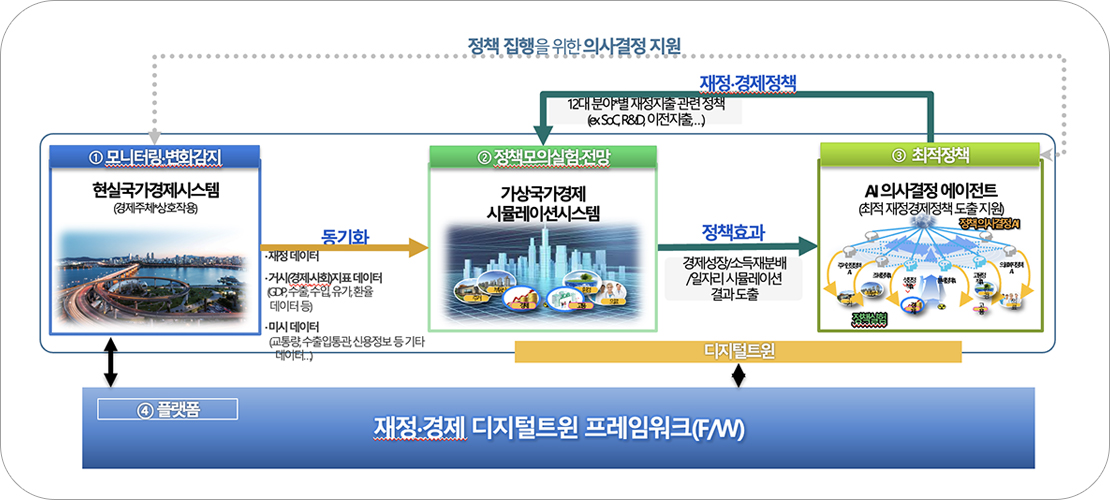
Overview of Financial & Economic Digital Twin Framework
It is viewed that this technical cooperation between ETRI and IIASA will enable the setting of a virtual nation with common economical/social frameworks, opening up the possibility for creative experiments that can help us address complex policy elements that are difficult to deal with in reality. With this approach, it is expected to enable local and central governments to make reliable policy decisions based on scientific evidence.
For example, when changes in economic indicators are detected through the monitoring within a real national economic system, technologies such as digital twins can be used to conduct policy simulations and prospects in a virtually set national economic system that replicates the real world. In this virtual system, macro/micro data are also entered and synchronized in addition to financial data. After that, the AI decision-making agents conduct the experiment to come up with an optimal policy. Through this process, this series of fiscal/economic digital twin frameworks plays a pivotal role in actively supporting the decision-making required for optimal planning and execution of policies.
ETRI has a number of R&D performances and core technologies related to the following areas: ▲Analysis & Prediction of National Economic/Social Phenomena ▲AI Technology for National Policy Decision-Making ▲Policy Intelligence Convergence Platform Technology. Meanwhile, IIASA is focusing their resources on studying various complex issues such as environment, energy, climate change, economy, technology, policy, etc., through advanced system analysis to address those issues and come up with a sustainable solution.
Lee Yeon-hee, the director of ETRI’s Fiscal and Economic Policy Intelligence Research Center, said, “Through our technical cooperation with IIASA, we will be able to improve our capacities in various areas such as systemic analysis of complex issues, scientific prediction, and modeling research for the development of a sustainable policy intelligence solution.”
Poledna Sebastian*, Leader of the IIASA Exploratory Modeling of Human-natural Systems (EM) Research Group, also claimed, “The signing of a new cooperation agreement with ETRI will serve as a wonderful opportunity for both institutions to expand the scope of the recently developed monetary policy model into other areas such as policy analysis based on government function and future decision-making activities.”
Since 2022, ETRI has been carrying out the task “AI/Data-Based Financial & Economic Digital Twin Platform Development” as a part of the “ICT Convergence Industry Innovation Technology Development Project,” which is supported by the Ministry of Science and ICT, and the Institute for Information & Communication Technology Planning & Evaluation (IITP).
Through this study, ETRI aims to develop a quality policy intelligence that can propose and verify public policies, including national fiscal policies and public policies, utilizing social/economic big data and AI technology. They are also working on other technologies such as a virtual national economy simulation program equipped with virtual experiment and large-scale data collection features to monitor the real-world economy, an AI-based decision-making system to derive optimal policies, financial/economic digital twin framework, etc.
Meanwhile, the data framework management interface developed by the researchers of ETRI has been adopted as the new international standard at the International Telecommunications Union’s Telecommunication Standardization Sector Study Group 11 (Protocol & Test Standards) Meeting, which was held in Geneva, Switzerland last May.
* Poledna Sebastian: Leader of the IIASA Exploratory Modeling of Human-natural Systems (EM) Research Group
Jun Jong-Arm, Principal Researcher
Fiscal and Economic Policy Intelligence Research Center
(+82-42-860-4835 jajun@etri.re.kr)
News 3
ETRI’s CDMA Commercialization Technology Honored as a ‘Milestone’ by IEEE
- Co-listed with SK Telecom, Samsung Electronics, and LG Electronics as South Korea’s first IEEE Milestone
- Commemoration ceremony & Unveiling ceremony to celebrate the IEEE Milestone Recognition of CDMA Commercialization Technology (June 11)
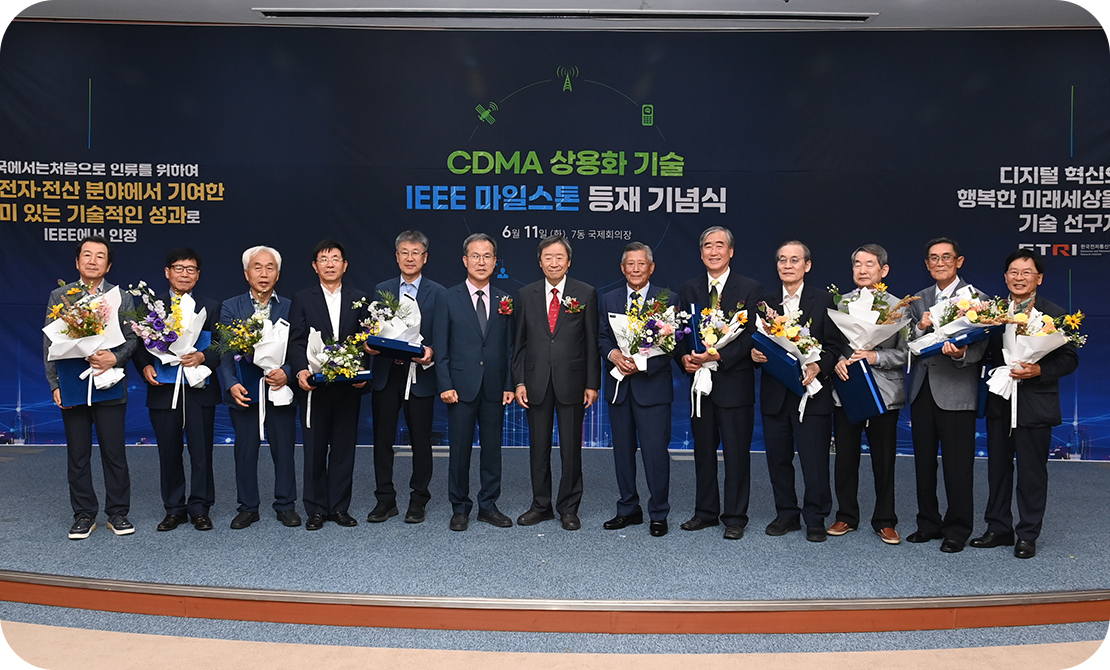
Commemoration Ceremony (June 11, 2024)
Korean researchers announced that Korea’s Code Division Multiple Access (CDMA) commercialization technology, which was the world’s first successfully commercialized CDMA technology in 1996, has been listed on the ‘Milestones Program,’ a world-renowned program hosted by the Institute of Electrical and Electronic Engineers (IEEE). As a result, it has become Korea’s first technology to be recognized by a world-class association to contribute to the development of mankind and industrial innovation.
Electronics and Telecommunications Research Institute (ETRI) announced on June 11 that their ‘CDMA Commercialization Technology’ will be the first Korean technology to be listed as a part of IEEE’s Milestone Program, along with other major Korean carriers SK Telecom, Samsung Electronics, and LG Electronics.
The IEEE Milestone Program is a well-renowned program that recognizes and celebrates meaningful technological feats that have made significant contributions to mankind in the fields of electricity, electronics, and computers. Applications can only be submitted after 25 years since the initial event has took place. The listing of ‘CDMA Commercialization Technology’ is incredibly meaningful in that it is the first Korean technology to be added to the IEEE Milestone Program.
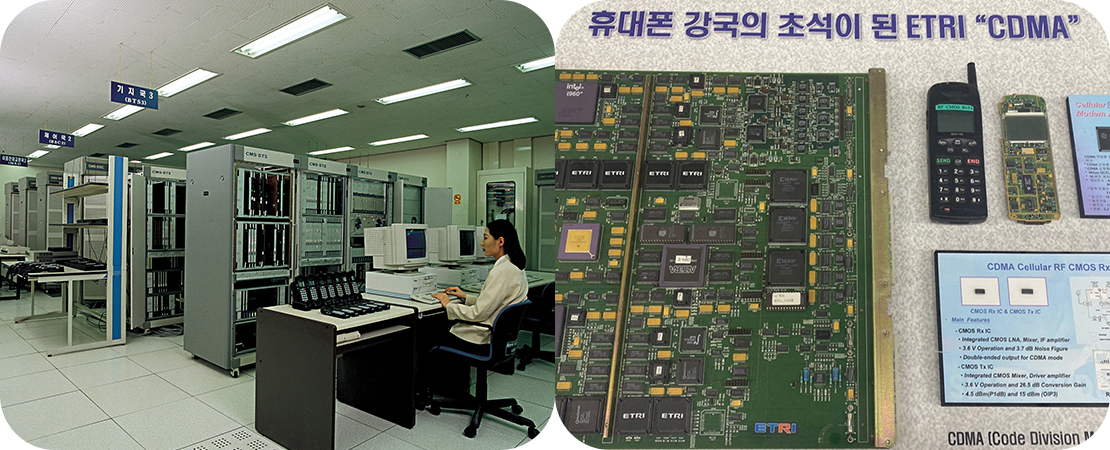
(Left) CDMA Base Station
(Right) ETRI CDMA, the foundation of South Korea’s monumental leap to a global mobile communication powerhouse
Regarding the timeline of the development of the world’s first commercialized CDMA technology, it all starts in the year 1986 when the Korean government developed its first Digital Electronic Switching System (TDX) through a government & ETRI-led project via the cooperation between multiple sectors within the industry, academia, and research institutions. Based on this experience, the government drew another plan in 1988 to develop a wireless communication system, which was carried out for four years until 1992, centered around ETRI.
As the importance of mobile communication gained more global attention during the early stages of development, the Korean government established the Digital Mobile Communication Development Project in 1989, promoting active R&D for seven years starting from 1990 to 1996.
Throughout this project, ETRI played a pivotal role as the main player of the plan. Following ETRI, other major Korean companies such as Samsung Electronics, Goldstar Communication (currently LG Electronics), Hyundai Electronics, Maxon Electronics have entered the consortium. As a telecommunication carrier, SKT was listed as a joint research institute. As such, the Digital Mobile Communication Project was a government-led project that garnered a lot of attention, carried out on a national level.
The impact of CDMA Commercialization Technology on the industry of Korea was huge. It literally pushed Korea into the center of the global mobile communication landscape after being irrelevant for years. In other words, after going through rough patches throughout the late 80s to early 90s, becoming the first country in the world to commercialize CDMA was the first huge step that led Korea to becoming the global IT powerhouse that it is today.
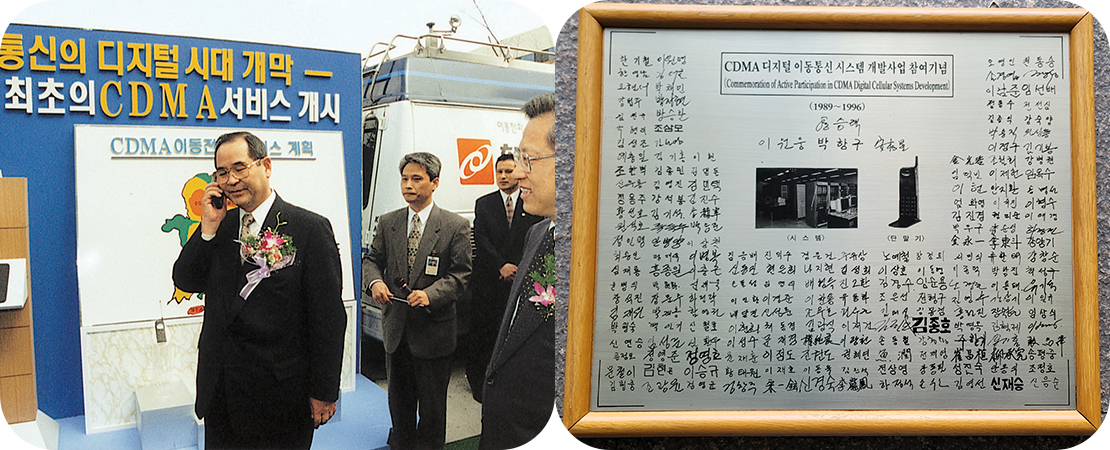
(Left) Launching of the world’s first CDMA service. Dawn of the digital era of mobile communication
(Right) Signatures of key players who participated in the development of the CDMA Digital Mobile Communication System
The commercialization of the 2nd-generation CDMA technology has laid a strong foundation for future success, leading to not only the successful commercialization of 3rd-generation, 4th-generation, and 5th-generation mobile communication, but also allowing Korea to be at the leading position even today where we are facing the dawn of 6th-generation wireless communication.
To celebrate this feat, ETRI held a ceremony on June 11, inviting current and former researchers who have participated in the development of CDMA technology.
Starting with ETRI President Bang Seung-chan’s welcoming speech, the event was attended by a number of leading figures of the industry, including Yang Seung-taik (Former Minister of Information and Communication), Bahk Hang-gu (Chairperson of Soamsystel), and Professor Han Young-nam. The unveiling ceremony also took place at the 7th Building of ETRI (ETRI Hall of Fame) to commemorate the listing of CDMA Commercialization Technology to the IEEE Milestone Program.
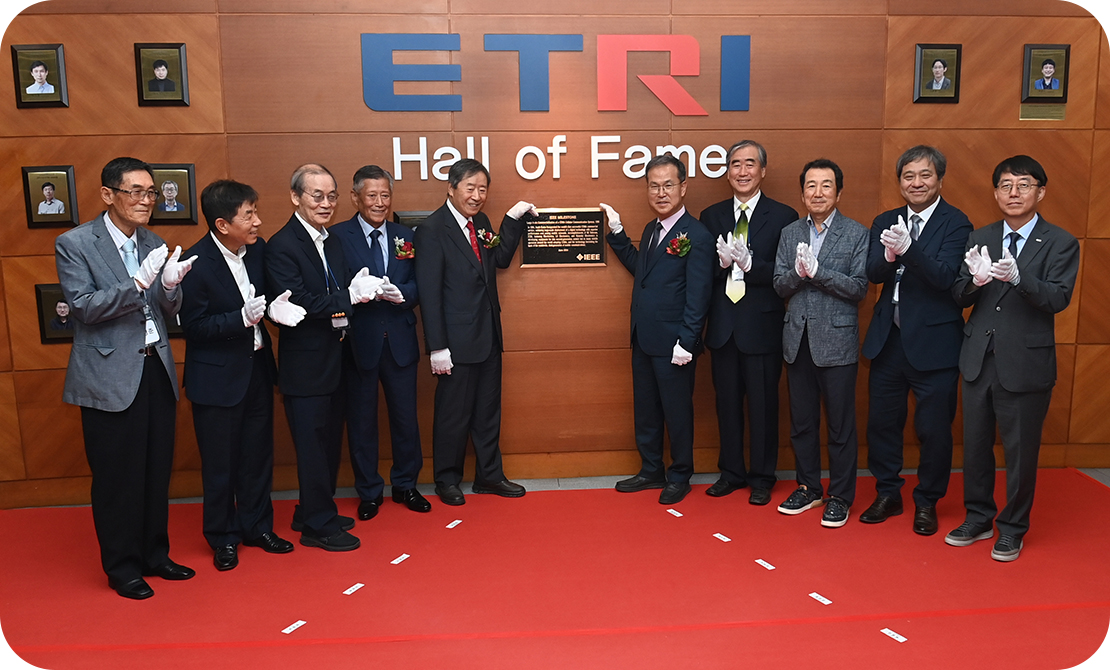
Unveiling Ceremony (June 11, 2024)
The event was concluded with the participants visiting the ETRI History Hall, which was opened to the public first time in April this year. The commemorative copper plate received to celebrate the listing to the IEEE Milestone Program will be permanently preserved in the ETRI History Hall.
Bang Seung-chan, the President of ETRI, said, “This listing of the Commercialization of our CDMA Technology to the IEEE Milestone Program marks a monumental step forward where the efforts of our researchers have been recognized globally for the first time. It is an incredible feat that highlights the outstanding achievements and contributions our researchers have made to mankind and science.”
ETRI is currently striving to make another huge step forward, focusing on the development of 6G wireless communication technology.
Kim Il Gyu, Assistant Vice President
Mobile Communication Research Division
(+82-42-860-5490 igkim@etri.re.kr)
 Previous
Previous